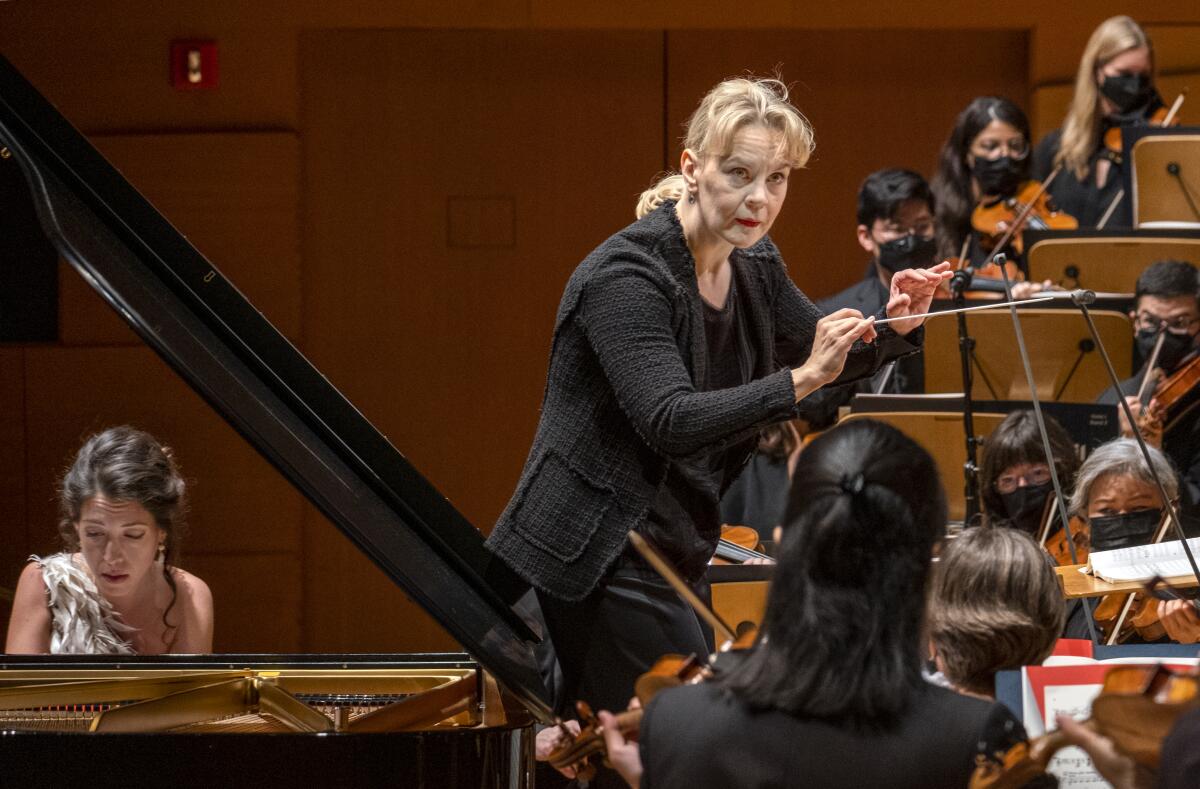Celebrated Finnish composer Kaija Saariaho drove from L.A. to San Diego. ‘Vista’ was the result

- Share via
When she was last in L.A. three years ago, composer Kaija Saariaho drove down the coast. The Finnish composer was elated by the Los Angeles Philharmonic’s performance of her harp concerto, “Trans,” conducted by principal guest conductor Susanna Mälkki. Saariaho had completed her shocking opera “Innocence” and was about to start on a new orchestra piece for Mälkki, for which the L.A. Phil would be a co-commissioner. A little inspiration wouldn’t hurt.
As the composer writes in her program note for “Vista,” which saw its U.S. premiere by Mälkki and the L.A. Phil last weekend, the many striking “vistas” along the drive to San Diego proved influential for her latest work. Saariaho has a striking visual sensibility. An extraordinary musical colorist, she has a knack for capturing beauty within sound that has brought her a devoted following of entranced fans. The Halloween matinee performance, which I heard Sunday in Walt Disney Concert Hall, proved ethereal and, yes, haunting.
While “Vista” is essentially an abstract study in the transformation of an ever-shifting musical landscape of melodic shapes, textures, timbres and harmonies, an inevitable sense of foreboding pervades its off-heated atmosphere. Take that drive today and hop off the 405 at San Pedro and your vista will be of ocean-impairing freighters, backed up further than the eye can see, and polluting trucks galore. Another stop, Huntington Beach, is home to the horrendous oil spill from not long ago. The first real view on the 5 of our glorious coastline comes at San Onofre beach, where looms an old nuclear reactor, with its 3.6-million-pound hoard of nuclear waste stored 100 feet from a globally rising sea.
As a composer whose music has long sung of the elements — “True Fire” and “Earth’s Shadows” were both played at the L.A. Phil in recent years — Saariaho has now captured, consciously or not, the sound of vanishing vistas.
Lasting around 25 minutes, “Vista” comes in two parts — “Horizons” and “Targets” — and opens with an intriguing, long and nasal oboe melody. That is soon underpinned by strings providing Saariaho’s “spectral” harmonies, a series of complex interactions of eerie, high and half-heard pitches that can stimulate a listener’s nervous system in unpredictable ways, be it provoking excitement, anxiety or annoyance.
Much like a drive on the 5, these musical vistas are interrupted. Loudly clustered winds and brass, along with trilling and sliding strings, offer little peace. But a lengthy, meditative, trance-like stretch does lower the temperature, signaling the end of the horizon. The daydream is broken by the beginning of “Targets,” when the horizon turns into sonic shards. “Vista” ends in quiet but not quiescence. It resounds, as Saariaho’s music so often does, long afterward.
Coronavirus may have silenced our symphony halls, taking away the essential communal experience of the concert as we know it, but The Times invites you to join us on a different kind of shared journey: a new series on listening.
That’s exactly what Mälkki seemed to have prophetically had in mind. Because of pandemic cancellations, she has not been back to the L.A. Phil in nearly two years, but she’s been active since then. She’s had an online pandemic presence with the Helsinki Philharmonic Orchestra, of which she is chief conductor, and you can watch last spring’s world premiere of “Vista,” played by a distanced orchestra and without an audience, on Vimeo. She followed that with another performance of “Vista” with the Berlin Philharmonic (which can be seen on that orchestra’s Digital Concert Hall). She also led the triumphant premiere of “Innocence” in Aix-en-Provence this summer.
Mälkki’s new Helsinki Philharmonic recording of Béla Bartók’s Music for Strings, Percussion and Celesta, along with the Concerto for Orchestra, is a dazzler. Her name is increasingly bandied about when major orchestras begin searches for new music directors, as it has been with the New York Philharmonic. Mälkki’s L.A. Phil performances can only help boost her profile, and she’ll be returning for a second program at Disney this weekend.
Tchaikovsky’s Piano Concerto No. 1, with the Italian soloist Beatrice Rana, was the unlikely work to follow “Vista.” But Mälkki’s performance of Alexander Scriabin’s “The Poem of Ecstasy” after intermission was so big, deafening and daringly overpowering that it had a dazed perfection for those of us ecstatic enough to experience it.
Even the Tchaikovsky chestnut was played for power. Rana, who has a large following for the fullness of her tone and her finesse, thundered here. She had to; Mälkki thundered. Dialogues between piano and winds were sharp and angular.
In the immoderate “Poem of Ecstasy,” a solo violin sings of love. A huge orchestra heaves and erupts. Deep brass and the Disney organ vibrate the floor, massaging everyone’s feet. Percussion takes no prisoners.
It wasn’t for everyone; several people left at intermission. But “Ecstasy” here was prescribed to the willing. It is never less than its title announces, but I have never heard it played with more convincing — and tasteful! — magnificence.
On a poignant note, the L.A. Phil’s pianist, Joanne Pearce Martin, performed a moving solo performance of Henry Mancini’s “Moon River” in memory of Ginny Mancini. One of the orchestra’s most loyal and longtime supporters, Mancini died in late October at 97 and will be very much missed.
Los Angeles Philharmonic
What: Susanna Mälkki conducts Reich, Adams and Rachmaninoff
When: 8 p.m. Saturday, 2 p.m. Sunday
Tickets: $55-$192
Info: (323) 850-2000, laphil.com
More to Read
The biggest entertainment stories
Get our big stories about Hollywood, film, television, music, arts, culture and more right in your inbox as soon as they publish.
You may occasionally receive promotional content from the Los Angeles Times.












